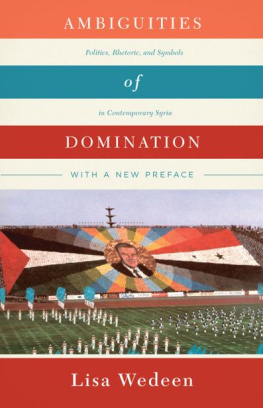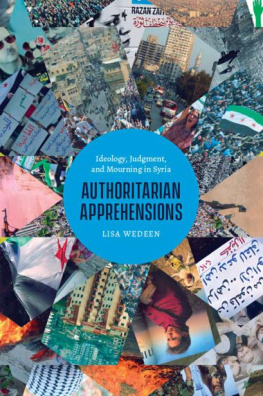Lisa Wedeen - Ambiguities of Domination
Here you can read online Lisa Wedeen - Ambiguities of Domination full text of the book (entire story) in english for free. Download pdf and epub, get meaning, cover and reviews about this ebook. year: 2015, publisher: University of Chicago Press, genre: Politics. Description of the work, (preface) as well as reviews are available. Best literature library LitArk.com created for fans of good reading and offers a wide selection of genres:
Romance novel
Science fiction
Adventure
Detective
Science
History
Home and family
Prose
Art
Politics
Computer
Non-fiction
Religion
Business
Children
Humor
Choose a favorite category and find really read worthwhile books. Enjoy immersion in the world of imagination, feel the emotions of the characters or learn something new for yourself, make an fascinating discovery.
- Book:Ambiguities of Domination
- Author:
- Publisher:University of Chicago Press
- Genre:
- Year:2015
- Rating:3 / 5
- Favourites:Add to favourites
- Your mark:
- 60
- 1
- 2
- 3
- 4
- 5
Ambiguities of Domination: summary, description and annotation
We offer to read an annotation, description, summary or preface (depends on what the author of the book "Ambiguities of Domination" wrote himself). If you haven't found the necessary information about the book — write in the comments, we will try to find it.
Lisa Wedeen: author's other books
Who wrote Ambiguities of Domination? Find out the surname, the name of the author of the book and a list of all author's works by series.
Ambiguities of Domination — read online for free the complete book (whole text) full work
Below is the text of the book, divided by pages. System saving the place of the last page read, allows you to conveniently read the book "Ambiguities of Domination" online for free, without having to search again every time where you left off. Put a bookmark, and you can go to the page where you finished reading at any time.
Font size:
Interval:
Bookmark:
LISA WEDEEN is the Mary R. Morton Professor of Political Science and the College and codirector of the Chicago Center for Contemporary Theory at the University of Chicago.
The University of Chicago Press, Chicago 60637
The University of Chicago Press, Ltd., London
1999, 2015 by The University of Chicago.
All rights reserved. Published 2015.
Printed in the United States of America
24 23 22 21 20 19 18 17 16 151 2 3 4 5
ISBN-13: 978-0-226-33337-3 (paper)
ISBN-13: 978-0-226-34553-6 (e-book)
DOI: 10.7208/chicago/978022345536.001.0001
library of congress cataloging-in-publication data
Wedeen, Lisa, author.
Ambiguities of domination : politics, rhetoric, and symbols in contemporary Syria : with a new preface /Lisa Wedeen.
pages ; cm
Includes bibliographical references and index.
ISBN 978-0-226-33337-3 (pbk. : alk. paper) -- ISBN 978-0-226-34553-6 (ebook) 1. Symbolism in politics--Syria. 2. Rhetoric--Political aspects--Syria. 3. Syria--Politics and government--1971-2000. 4. Assad, Hafez, 1930-2000. 5. Political culture--Syria. 6. Public opinion--Syria. I. Title.
DS98.4.W43 2015
320.95691--dc23
2015020384
This paper meets the requirements of ANSI/NISO Z39.481992 (Permanence of Paper).
WITH A NEW PREFACE
The University of Chicago Press
Chicago and London
Having spent decades managing discontent, the Syrian regime found itself in unfamiliar waters when in March 2011 it encountered formidable popular protests. Inspired by uprisings in Tunisia, Egypt, Yemen, and Libya, protestors in Syria began gathering in primarily peaceful demonstrations, calling for meaningful political reforms and then, as the regime responded by attempting to squelch unrest, escalating to demands for an end to Bashar al-Asads rule. Many readers will recall the initial focal point for large-scale demonstrations in the brutal treatment of fifteen school children who had written antiregime graffiti on the walls of a local school in the southern town of Dar`a. A small number of angry protestors reacted to the brutality by marching on the governors mansion after Friday prayers, demanding the childrens release. A week later, a large crowd exited Dar`as main mosque after noon prayers loudly denouncing the regime. Security forces opened fire, killing four men and inaugurating a cycle of protests and crackdowns, mobilizing protests in neighboring villagesand by March 25 in other regions of Syria.
Outrage over disclosures that the Dar`a children were being tortured in prison, over the disrespect shown to elders attempting to negotiate their release, and at the sheer unaccountability of regime officials linked to the ruling family who were responsible for the childrens treatment tapped into a reservoir of preexisting dissatisfaction with official corruption, authoritarian caprice, and the governments inattentiveness to suffering. With spirit, with blood, we sacrifice for you, ya Dar`a (bi ruh, bi dam, nafdiki ya Dar`a) played on the regimes slogan of sacrifice for Syrias leader (bi ruh, bi dam, nafdiki ya Bashshar). Voicing the national we as a commitment to the
At the time of this writing, four years later, the very collectivity of Syria has come under increasing challenge, threatened by an international arms market that knows no bounds; by seductive calls to sectarian, regional, and supranational commitments; by the cynical tactics of a regime fighting for its survival; by battles won and territories surrendered; by inertia, fear, displacement, wishful thinking, and exhaustion; by countervailing (but decidedly unhelpful) tendencies towards interference and inaction on the part of international actorsand by opportunists of all sorts. As in most bloody wars, it is the broken lives of ordinary survivors that will have to be pieced back together one day. And as in most tragedies, along with the devastating heartache and loss come moving examples of grace and dignity. We should not allow todays shocking atrocities to blind us to those initial heady days of revolt, to the youthful hopes that powered them, the important refutations of tyranny, and the revelatory pleasures of self-discovery that produced a world-affirming, albeit short-lived, sense of the political. Any emancipatory politics of the future will have the possibilities inherent in those initial moments to draw on, when people strove for what Hannah Arendt calls worldly immortality, attempting to inaugurate an affirmative politics that relies on but also has the capacity to outlive any single individuals display of courage.
It is gratifying to know that Ambiguities of Domination, published in English in 1999 and translated into Arabic in 2010, continued to offer for some Syrians in 2011 (especially those who identified with an oppositional consciousness) an account of politics that resonated with their own experiences as citizens under dictatorship. In the context of the uprising, the Arabic version of the book generated widespread commentary, as the focus of at least one televised discussion and as a point of reference in any number of articles, often serving purposes that went far beyond my own nerdy intellectual preoccupationsor my political predilections. The book has been generally well-received in the United States in the confines of the academy,
Although not all of the regimes claims were as patently spurious as the ones specific to the personality cult, the official rhetoric in general, controlled by what seemed an ossifying Ba`th party, became increasingly wooden and outmoded as Hafiz al-Asads rule wore on. Granted, many Syrians felt a certain pride in the elder Asads command of foreign policy, representing a widespread consensus in favor of ongoing national resistance to what were understood as genuine foreign policy threats and a conviction that despite a gradual reduction in provisions, critical aspects of the welfare state were to be maintained.
Or to put all this a bit differently: Under the elder Asad it was easy to find examples of the distanced, irreverent attitude adopted by most Syrians toward regime rhetoric.
The complexities of the first decade of the twenty-first century stand in contrast to this earlier period. On the one hand, what are we to make of the public demonstrations of support for Bashar al-Asad at the beginning of the uprising, when great throngs of people, seemingly independent of regime directive, flooded the streets wearing T-shirts of the presidents face, waving flags, and honking horns? Testimonies of love for the president were abundant on Facebook pages and continue to appear, in tweets and on the internet sites of minhibbakji[s]the name derived from a 2007 presidential election slogan designating good citizens devotion to their leader. On the other hand, the complexities are apparent in the constant poking fun at the president on user-created websites (something no one dared before the uprising), the cartoons comparing him to other departed dictators, the challenge to the official portrayal of events by satellite television channels such as Al Jazeera and Al Arabiya, and social media of all kinds calling for the end of the regime. If the earlier era of Hafiz al-Asad registered the ambiguities to be seen in overtly authoritarian logics of domination, the contemporary periods ambiguities suggest the intricacies of rule in a market-oriented, information-awash era in which various forms of sovereigntyboth personal and collectiveare threatened not only by violence but also by new forms of disorientation and uncertainty.
This uncertainty is connected to the ways in which official ideology ceased in the new century to be the privileged domain of the Ba`th Party, which had previously regulated both the content and the institutional circuits of discursive dissemination. With the rise of Bashar al-Asad, Syrian television dramas and advertising helped to These new modes of social control, part of a system I call neoliberal autocracy, turned on a series of contradictions and incoherencies that may have helped produce conditions for, but certainly did not themselves cause, the current state of turmoil. After all, regimes and individuals live with contradictions and incoherencies all the time. But I am getting ahead of myself, for these matters are central to my new book project, one beholden to, but also moving beyond,
Next pageFont size:
Interval:
Bookmark:
Similar books «Ambiguities of Domination»
Look at similar books to Ambiguities of Domination. We have selected literature similar in name and meaning in the hope of providing readers with more options to find new, interesting, not yet read works.
Discussion, reviews of the book Ambiguities of Domination and just readers' own opinions. Leave your comments, write what you think about the work, its meaning or the main characters. Specify what exactly you liked and what you didn't like, and why you think so.











